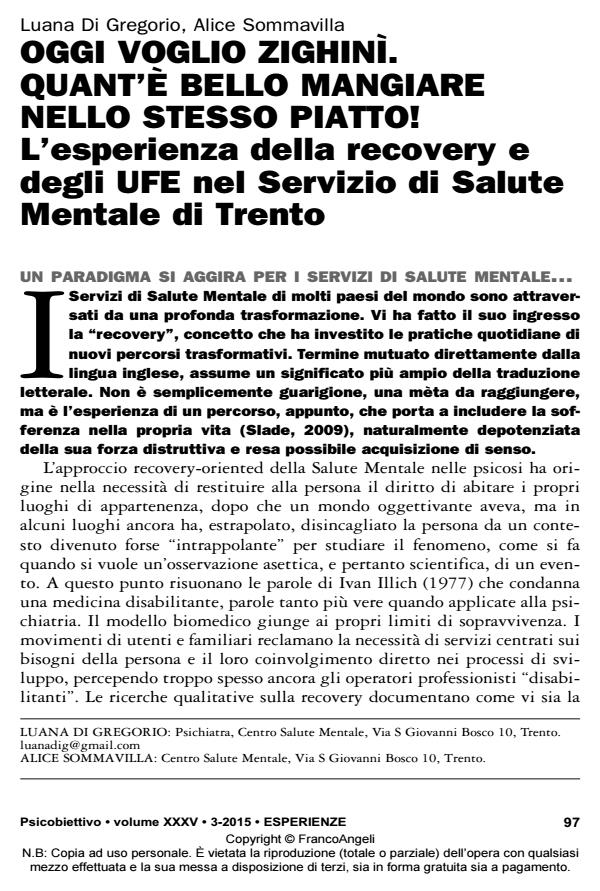Today i want Zighinì. How great to eat off one plate is! The experience of recovery and of ufe in the mental health service of trento
Journal title PSICOBIETTIVO
Author/s Luana Di Gregorio, Alice Sommavilla
Publishing Year 2016 Issue 2015/3
Language Italian Pages 8 P. 97-104 File size 95 KB
DOI 10.3280/PSOB2015-003006
DOI is like a bar code for intellectual property: to have more infomation
click here
Below, you can see the article first page
If you want to buy this article in PDF format, you can do it, following the instructions to buy download credits

FrancoAngeli is member of Publishers International Linking Association, Inc (PILA), a not-for-profit association which run the CrossRef service enabling links to and from online scholarly content.
Zighinì is an Eritrean speciality. Delicious! It is one plate placed in the middle of the table, made of bread, vegetables, meat, spices, eaten all toghether using the hands. This experience is strongly recommended before starting a journey into recovery. After decades from the first step into the process of deistituzionalization of psychiatry and the evolution of mental health, the services that deal with this topic on a dayly basis have to answer different questions. On one hand they need to answer their business organization and the continuus request of implementing practices not always "evidence based", on the other hand there is the necessity to avoid the implementation of an impersonal and aseptic practice which leads to an attitude that alienates the community from the involvement in the discourse of mental health. This raises the question of how to overcome this problem. How to confront this narrow path without falling down from the edge? At this point there is the need to come up with new strategies to avoid the risk of a cultural isolation of Mental Health, according to recommendations from most prestigious institutions worldwide on the centrality of mental health in the life of all the population in the world. Therefore, the requirement to create new spaces of close relationship with all stakeholders together arises. Moreover, starting from the new paradigm which invest mental health, there are new practices developed in mental health services, where the idea to share principles with the participation of professionals, users, relatives and citizens all around the same table is suggested, inspiring an attitude of equality and respecting each one’s knowledge. Inspired from those principles, Renzo Destefani created the "doing toghether" philosophy which brought Users and Familiars Experts in the places historically opend only to professionals. In the Mental Health Service of Trento, every day we share the good practice of different knowledges is ahred enhancing technical approach not only by empathy, but also by sympatheia.
Keywords: Places vs Services; Feel vs Understand; Sym-pátheia vs Enpátheia; Recovery-Oriented Approach; Value-Based Practices; UFE; Doingtoghether
Luana Di Gregorio, Alice Sommavilla, Oggi voglio Zighinì. Quant’è bello mangiare nello stesso piatto! L’esperienza della recovery e degli Ufe nel servizio di salute mentale di Trento in "PSICOBIETTIVO" 3/2015, pp 97-104, DOI: 10.3280/PSOB2015-003006